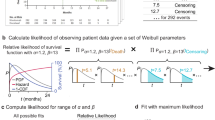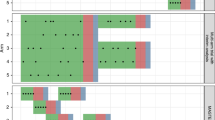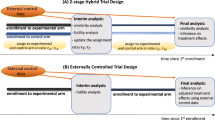Abstract
The motivation for proposing sequential methods for cancer clinical trials is presented, and the methodology examined by re-analysing two completed phase III cancer trials of the Lung Cancer Working Party of the British Medical Research Council. The reanalysis proceeds as if the trials had been designed with a planned series of interim analyses governing stopping. Specifically, the triangular and double-triangular tests were applied. The sequential reanalysis gave a substantial reduction in the number of patient required, and deaths observed, for conclusions to be reached in comparison with the completed studies. In each case, the sequential analysis was stratified for baseline prognostic factors which were seen to be important at the first interim analysis.
This is a preview of subscription content, access via your institution
Access options
Subscribe to this journal
Receive 24 print issues and online access
$259.00 per year
only $10.79 per issue
Buy this article
- Purchase on Springer Link
- Instant access to full article PDF
Prices may be subject to local taxes which are calculated during checkout
Similar content being viewed by others
Author information
Authors and Affiliations
Rights and permissions
About this article
Cite this article
Donaldson, A., Whitehead, J., Stephens, R. et al. A simulated sequential analysis based on data from two MRC trials. Br J Cancer 68, 1171–1178 (1993). https://doi.org/10.1038/bjc.1993.499
Issue Date:
DOI: https://doi.org/10.1038/bjc.1993.499



